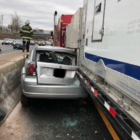AAA Northeast 2020
AAA Says More Infant Car Seats in CT Face Rear, But More Would Be Better
|
More parents and guardians are following Connecticut’s Child Passenger Safety (CPS) seat law for infants since the state strengthened the original mandate in 2017, says AAA Northeast. — an announcement from AAA Northeast
Currently, infants must ride rear facing until they turn 2 years old and weigh at least 30 pounds, an upgrade from the earlier requirement of 1 year and 20 pounds. To highlight National CPS Week (Sept. 20 – 26), AAA Northeast analyzed data from the UConn Crash Data Repository and found more children under age two have been riding rear facing in recent years. In fact, the percentage of children under 2 who are riding rear facing increased from 45% in 2015 — before the law was upgraded — to 61% last year.




